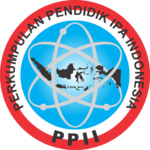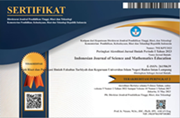Metacognitive approach based on differences in self-regulated learning skills toward mathematical reflective thinking for primary school students
Abstract
Keywords
Full Text:
PDFReferences
M. N. Kholid, C. Sadijah, E. Hidayanto, H. Permadi, and R. M. F. Firdareza, “Pupils’ reflective thinking in solving linear equation system problem,” J. Math. Educ. Teach. Pract., vol. 1, no. 1, pp. 19–27, 2020, [Online]. Available: https://dergipark.org.tr/en/pub/jmetp/issue/55820/740132
S. Hartati, R. A. Bilqis, and A. Rinaldi, “Mathematical problem-solving abilities and reflective thinking abilities: The impact of the influence of eliciting activities models,” Al-Jabar J. Pendidik. Mat., vol. 11, no. 1, pp. 167–178, 2020, doi: 10.24042/ajpm.v11i1.6709.
H. Yildiz Durak, “The effects of using different tools in programming teaching of secondary school students on engagement, computational thinking and reflective thinking skills for problem solving,” Technol. Knowl. Learn., vol. 25, no. 1, pp. 179–195, 2020, doi: 10.1007/s10758-018-9391-y.
M. Hayun and N. Kurniawati, “EduBasic Journal : Jurnal Pendidikan Dasar Analysis of metacognitive approach to the mathematics reasoning ability of students of state elementary school of Pamulang 01,” vol. 4, no. 1, pp. 31–40, 2022, doi: https://doi.org/10.17509/ebj.v4i1.38753.
M. N. Kholid, C. Sa’dijah, E. Hidayanto, and H. Permadi, “How are students’ reflective thinking for problem solving?,” J. Educ. Gift. Young Sci., vol. 8, no. 3, pp. 1135–1146, 2020, doi: 10.17478/JEGYS.688210.
M. N. Kholid, S. Telasih, L. N. Pradana, and S. Maharani, “Reflective thinking of mathematics prospective teachers’ for problem solving,” J. Phys. Conf. Ser., vol. 1783, no. 1, 2021, doi: 10.1088/1742-6596/1783/1/012102.
Y. Junaedi and W. Wahyudin, “Improving student’s reflective thinking skills through realistic mathematics education approach,” vol. 438, no. Aes 2019, pp. 196–202, 2020, doi: 10.2991/assehr.k.200513.044.
S. Sumardi and A. C. Tyas, “Reflective thinking profile of high school students in solving hots-type questions reviewed from adversity quotient,” JTAM (Jurnal Teor. dan Apl. Mat., vol. 6, no. 4, p. 905, 2022, doi: 10.31764/jtam.v6i4.9376.
A. Salido and D. Dasari, “The analysis of students’ reflective thinking ability viewed by students’ mathematical ability at senior high school,” J. Phys. Conf. Ser., vol. 1157, no. 2, 2019, doi: 10.1088/1742-6596/1157/2/022121.
I. Permatasari, S. H. Noer, and P. Gunowibowo, “Efektivitas metode pembelajaran PQ4R ditinjau dari kemampuan berpikir reflektif matematis dan self-concept siswa,” Pythagoras J. Pendidik. Mat., vol. 15, no. 1, pp. 61–72, 2020, doi: 10.21831/pg.v15i1.33830.
A. Salido, D. Suryadi, D. Dasari, and I. Muhafidin, “Mathematical reflective thinking strategy in problem-solving viewed by cognitive style,” J. Phys. Conf. Ser., vol. 1469, no. 1, 2020, doi: 10.1088/1742-6596/1469/1/012150.
U. Akpur, “Critical, reflective, creative thinking and their reflections on academic achievement,” Think. Ski. Creat., vol. 37, no. May, 2020, doi: 10.1016/j.tsc.2020.100683.
S. Sarwi, P. Marwoto, E. Susilaningsih, Y. F. Lathif, and W. Winarto, “Science learning STEM-R approach: A study of students’ reflective and critical thinking,” J. Educ. Learn., vol. 18, no. 2, pp. 462–470, 2024, doi: 10.11591/edulearn.v18i2.21080.
Ş. Orakcı, “Teachers’ reflection and level of reflective thinking on the different dimensions of their teaching practice,” Int. J. Mod. Educ. Stud., vol. 5, no. 1, p. 117, 2021, doi: 10.51383/ijonmes.2021.88.
R. P. Antonio, “Developing students’ reflective thinking skills in a metacognitive and argument-driven learning environment,” Int. J. Res. Educ. Sci., vol. 6, no. 3, pp. 467–483, 2020, doi: 10.46328/ijres.v1i1.1096.
C. Dignath and M. V. J. Veenman, “The role of direct strategy instruction and indirect activation of self-regulated learning—evidence from classroom observation studies,” Educ. Psychol. Rev., vol. 33, no. 2, pp. 489–533, 2021, doi: 10.1007/s10648-020-09534-0.
R. Gestiardi and I. Maryani, “Analisis self-regulated learning (SRL) siswa kelas VI sekolah dasar di Yogyakarta,” Prem. Educ. J. Pendidik. Dasar dan Pembelajaran, vol. 10, no. 2, p. 227, 2020, doi: 10.25273/pe.v10i2.7379.
B. J. Zimmerman and D. H. Schunk, Self-Regulated of Learning and Performance An Introduction and an Overview. 2011. [Online]. Available: https://www.taylorfrancis.com/books/edit/10.4324/9780203839010/handbook-self-regulation-learning-performance-dale-schunk-barry-zimmerman
W. O. Dahiana, D. A. Ngilawajan, P. Arjanto, and W. Halija, “Metacognitive approach to improve students’ mathematical problem solving skills based on thinking styles,” J. Didakt. Mat., vol. 9, no. 2, pp. 248–260, 2022, doi: 10.24815/jdm.v9i2.23479.
Q. Aini, “Identifikasi kemampuan metakognisi siswa SD dalam pemecahan masalah berdasarkan disposisi matematis,” J. Medives J. Math. Educ. IKIP Veteran Semarang, vol. 3, no. 1, p. 97, 2019, doi: 10.31331/medivesveteran.v3i1.688.
M. Suliani, D. Juniati, and A. Lukito, “The influence of student’s mathematical beliefs on metacognitive skills in solving mathematical problem,” Int. J. Eval. Res. Educ. , vol. 13, no. 3, pp. 1481–1491, 2024, doi: 10.11591/ijere.v13i3.27117.
F. R. Fajri and M. F. Amir, “Math self-regulated learning assisted by metacognitive support by reviewing sex differences in mathematics anxiety,” REID (Research Eval. Educ., vol. 8, no. 2, pp. 100–113, 2022, doi: 10.21831/reid.v8i2.49157.
R. Rustina and I. Muzdalipah, “Metakognisi matematis siswa berdasarkan intellegence quotient (iq),” AKSIOMA J. Progr. Stud. Pendidik. Mat., vol. 12, no. 1, p. 1085, 2023, doi: 10.24127/ajpm.v12i1.6671.
M. Cervin-Ellqvist, D. Larsson, T. Adawi, C. Stöhr, and R. Negretti, “Metacognitive illusion or self-regulated learning? Assessing engineering students’ learning strategies against the backdrop of recent advances in cognitive science,” High. Educ., vol. 82, no. 3, pp. 477–498, 2021, doi: 10.1007/s10734-020-00635-x.
john w. Creswell and j. david Creswell, Research design qualitative, quantitative, and mixed methods approaches, Fifth edit. 2018. doi: 10.4324/9780429469237-3.
D. C. D. van Alten, C. Phielix, J. Janssen, and L. Kester, “Secondary students’ online self-regulated learning during flipped learning: A latent profile analysis,” Comput. Human Behav., vol. 118, no. December 2020, p. 106676, 2021, doi: 10.1016/j.chb.2020.106676.
N. Made, I. Yani, I. N. Jampel, and I. W. Widiana, “Strategi pembelajaran metakognitif berbantuan video animasi meningkatkan emampuan berpikir reflektif matematika siswa sekolah dasar,” J. Media dan Teknol. Pendidik., vol. 4, no. 3, pp. 391–401, 2024, doi: https://doi.org/10.23887/jmt.v4i3.74788.
A. K. P. Ningrum, Novaliyosi, and H. Nindiasari, “Systematic literature review: Model problem based learning terhadap kemampuan berpikir reflektif matematis siswa,” J. Educ., vol. 10, no. 3, pp. 873–880, 2024, doi: https://doi.org/10.31949/educatio.v10i3.9325.
E. F. Asda, “Literatur review : Kesadaran metakognisi menggunakan model pembelajaran guided inquiry di Indonesia,” J. Media Akad., vol. 2, no. 2, pp. 2164–2176, 2024, doi: https://doi.org/10.62281/v2i2.157.
I. A. J. Silvi Nur Laila Sari, Bela Margareta, “Peningkatan kemampuan metakognitif untuk pengembangan problem solving siswa melalui proses,” J. Pendidik. dan Pembelajaran, vol. 13, pp. 2715–2723, 2024, doi: 10.26418/jppk.v13i10.87044.
M. Husain, S. Singkawang, and K. Barat, “Analisis kemampuan berpikir reflektif matematis ditinjau dari kemandirian belajar siswa nindy citroresmi prihatiningtyas,” J. Math. Educ. Sci., vol. 9, no. 2, pp. 2528–4363, 2024, doi: https://doi.org/10.30743/mes.v9i2.8841.
D. Amini, M. H. Anhari, and A. Ghasemzadeh, “Modeling the relationship between metacognitive strategy awareness, self-regulation and reading proficiency of Iranian EFL learners,” Cogent Educ., vol. 7, no. 1, 2020, doi: 10.1080/2331186X.2020.1787018.
R. Amalia, F. Fadilah, and A. Anwar, “Development of appy pie learning media based on metacognitive approach for atmhematical reflective thinking ability in geometry,” vol. 2019, no. July 2019, pp. 38–42, 2020, doi: 10.24071/seadr.2019.06.
D. C. D. van Alten, C. Phielix, J. Janssen, and L. Kester, “Self-regulated learning support in flipped learning videos enhances learning outcomes,” Comput. Educ., vol. 158, no. August, p. 104000, 2020, doi: 10.1016/j.compedu.2020.104000.
M. Kamalia and I. Nuriadin, “Analysis of the mathematical reflective thinking ability of MTs students in terms of self-regulated learning during the COVID-19 pandemic,” Desimal J. Mat., vol. 4, no. 2, pp. 165–176, 2021, doi: 10.24042/djm.
Y. Yuni, A. P. Kusuma, and N. Huda, “Problem-based learning in mathematics learning to improve reflective thinking skills and self-regulated learning,” Al-Jabar J. Pendidik. Mat., vol. 12, no. 2, pp. 467–480, 2021, doi: 10.24042/ajpm.v12i2.10847.
D. N. Munahefi, Kartono, B. Waluya, and Dwijanto, “Analysis of self-regulated learning at each level of mathematical creative thinking skill,” Bolema - Math. Educ. Bull., vol. 36, no. 72, pp. 581–601, 2022, doi: 10.1590/1980-4415v36n72a26.
H. Hamzah, M. I. Hamzah, and H. Zulkifli, “Self-regulated learning theory in metacognitive-based teaching and learning of high-order thinking skills (HOTS),” TEM J., vol. 12, no. 4, pp. 2530–2540, 2023, doi: 10.18421/TEM124-65.
DOI: http://dx.doi.org/10.24042/ijsme.v8i1.26157
Refbacks
- There are currently no refbacks.
Copyright (c) 2025 Unit Riset dan Publikasi Ilmiah Fakultas Tarbiyah dan Keguruan Universitas Islam Negeri Raden Intan Lampung

This work is licensed under a Creative Commons Attribution-ShareAlike 4.0 International License.

Indonesian Journal of Science and Mathematics Education is licensed under a Creative Commons Attribution-ShareAlike 4.0 International License.





